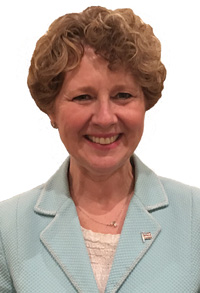On Wednesday, Congresswomen Susan W. Brooks (R-Ind.-05) and Debbie Wasserman Schultz (D-Fla.-23) reintroduced the Protecting Access to Lifesaving Screenings (PALS) Act. The PALS Act would postpone U.S. Preventive Services Task Force (USPSTF) recommendations that could severely limit women’s access to mammograms, and was passed previously extending the moratorium on USPSTF guidelines to 2021.

Brooks
“Women of all ages are affected by breast cancer and every woman should be able to access mammograms when they need them,” said Brooks. “Taking preventative measures, such as having mammograms, are key components to combating a disease that takes the lives of too many Hoosiers and Americans. If left in place, USPSTF recommendations put women, especially young women, at risk of losing insurance coverage for essential mammogram screenings that could save their life. I’m proud to continue work to protect coverage of life saving preventative screenings with my friend, and cancer survivor, Debbie Wasserman Schultz.”
Background
This year, more than 40,000 Americans will lose their lives to breast cancer. In 2017, the American Cancer Society estimated that 9 percent of new, fatal cases of breast cancer were among women in their forties. Despite that, the most recent recommendations from the USPSTF gave annual mammograms for women ages 40 to 49 a “C” grade, meaning they recommend that screening be performed only selectively, and stated that women between the ages of 50 and 74 should have mammograms only bi-annually. Because many insurance companies use these guidelines as the basis for coverage, 22 million women between 40 and 49 could be at risk for losing coverage for lifesaving mammograms.
The PALS Act protects access to annual mammograms with insurance coverage with no-copay starting at age 40 by extending the moratorium on the USPSTF breast cancer screening guidelines, and also ensures that women veterans treated in the Veterans Health Administration do not face these same obstacles to getting the care they and their health care providers deem necessary.
The PALS Act is supported by: the American College of Obstetricians and Gynecologists, American College of Radiology, American Women Unite for Breast Cancer Screening, Black Women’s Health Imperative, Breast Friends, Bright Pink, DenseBreast Info. Inc, Don’t Be a Chump! Check for a Lump!, FORCE: Facing Our Risk of Cancer Empowered, Living Beyond Breast Cancer, Men Against Breast Cancer, Moffitt Cancer Center, National Association of Nurse Practitioners in Women’s Health, National Black Nurses Association, National Consortium of Breast Centers, National Hispanic Medical Association, National Patient Advocate Foundation, Prevent Cancer Foundation, Servicewomen’s Action Network, Sharsheret, Society of Breast Imaging, Susan G. Komen, and Tigerlily Foundation.
“Access to breast cancer screening has been key in helping reduce mortality rates, by getting women diagnosed and into effective treatment as early as possible,” said Paula Schneider, CEO of Susan G. Komen. “Thank you to Congresswomen Wasserman Schultz and Brooks for reintroducing the Protecting Access to Lifesaving Screenings (PALS) Act. Ffailure to enact this critical legislation would result in women across the country forgoing needed screening, potentially with tragic consequences.”
“This proposed extension of the PALS Act protections would help avert a needless decline in breast cancer screening and thousands of deaths each year that could result from implementation of the ill-advised 2016 United States Preventive Services Task Force (USPSTF) breast cancer screening recommendations,” said Dana Smetherman, MD, chair of the American College of Radiology Breast Imaging Commission. “Women in underserved areas could be particularly hard hit if the PALS Act protections are not renewed. We strongly urge all members of Congress to support the PALS Act.”
“Cancers will be diagnosed at a later stage and lives will be lost unnecessarily if access to annual screening mammography is delayed for 10 years,” said Lisa Schlager, Vice President of Public Policy at Facing Our Risk of Cancer Empowered (FORCE). “Breast cancer is the most common cancer among American women, with about 20 percent of the diagnoses in those under age 50. FORCE wholeheartedly supports extension of the PALs Act.”
“If diagnosed early, the five-year survival rate for breast cancer is 99 percent – that’s why mammograms are so critical,” said Carolyn Aldigé, Founder and CEO of the Prevent Cancer Foundation®. “This reauthorization bill will ensure millions of women have access to this lifesaving screening without having to worry about a financial burden. We commend Representatives Wasserman Shultz and Brooks for their dedication to protecting women’s health.”
“The PALS Act is critical in maintaining access to mammography for women ages 40 and older particularly for black women,” said Linda Goler Blount with Black Women’s Health Imperative. “More than 25 percent of all breast cancers in black women occur before the age of 50 and 15 percent occur before the age of 45. Black women not only tend to be diagnosed with breast cancer younger, but they also tend to get a more aggressive form of breast cancer, which makes early detection even more critical. The higher death rates among black women are due to lack of access to early detection and quality treatment. If the age of screening mammography is raised to 50, another 1,200 to 1,300 black women will die from breast cancer each year. Black Women’s Health Imperative applauds Representatives Debbie Wasserman Schultz and Susan Brooks for their leadership on the PALS Act.”
“It is imperative and economically sound that women not only have access to breast health, also making it accessible to all women by eliminating financial barriers that hinders them from seeking breast cancer screenings due to economic inequalities, lack of knowledge and resources among other variables,” said Holly Rose of Don’t be a Chump! Check for a Lump!.
